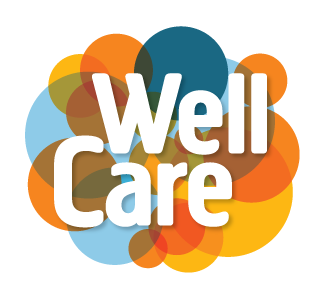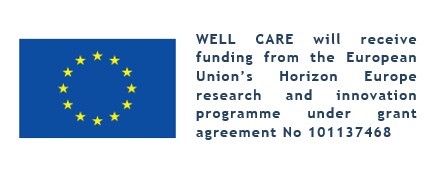WELL CARE
Project Overview WELL CARE
DOWNLOAD PROJECT LEAFLET IN PDF
Follow the project on LinkedIn.
 The WELL CARE project focuses on improving the resilience and mental wellbeing of informal carers and long-term care (LTC) workers by strengthening care partnerships. By care partnership we mean the coordination, integration, and mutual recognition of care and caring activities performed by LTC workers and informal carers, in a vision of integrated LTC.
The WELL CARE project focuses on improving the resilience and mental wellbeing of informal carers and long-term care (LTC) workers by strengthening care partnerships. By care partnership we mean the coordination, integration, and mutual recognition of care and caring activities performed by LTC workers and informal carers, in a vision of integrated LTC.
The WELL CARE project aims to increase the understanding of successful ways of preventing and managing mental health issues among informal carers and long-term care workers. This includes looking at personal factors, the environment, and how organizations can make solutions successful.
The ultimate goal is to develop a set of support measures (prototypes) to address the mental health needs of both LTC workers and informal carers, thus sustaining and enabling a vision of care partnerships between these two groups.
The WELL CARE project’s specific objectives are:
- to identify at least 40 good practices in the European Union (EU) and beyond, able to prevent or reduce both occupational and non-occupational risks for LTC workers’ and informal carers’ resilience and mental wellbeing;
- to develop, test and verify the outcomes of 5-8 innovative solutions (prototypes) in five countries (Germany, Italy, Netherlands, Slovenia, Sweden), together with local ecosystems (supportive environments) of stakeholders;
- to analyse related EU and national policies and formulate action-oriented recommendations for policymakers and stakeholders;
- to develop, implement and sustain a process of research, co-design, and sharing and using the findings with all groups involved and stakeholders at national and European levels.
The WELL CARE project will systematically involve LTC workers, informal carers, care recipients and stakeholders in local communities of practice (Blended Learning Networks). The project will consistently consider gender, inclusion and intersectionality perspectives to understand possible inequalities and necessary changes for more fair and inclusive policy and practice.
The consortium comprises a top-level group of researchers and national and EU level advocacy organisations led by Linnaeus University (coordinator), Sweden.
Project information
Principal Investigator: Elizabeth Hanson, Professor, Dept. Health & Caring Sciences, Faculty of Health and Life Sciences, Linnaeus University, Research Director, Swedish Family Care Competence Centre (Nka), Steering Board member, (former president) Eurocarers.
Contact: elizabeth.hanson@lnu.se
Participating organizations
Research partners: Linnaeus University (coordinator, PI), Sweden; Vrije Universiteit, Holland; Istituto Nazionale di Riposa e Cura per Anziani, IRCCS INCRA, Italy; Hochschule Zittau/Goerlitz Universitetet, Germany; Univerza v Ljubljani, Slovenia; University of North Carolina at Chapel Hill, USA.
Non-profit organisations and knowledge translation centres working in the 5 EU countries in the long term care sectors and informal care: Swedish Family Care Competence Centre (Nka), Netherlands Cares for Each Other (NZVE); Anziani e Non Solo, Italy; wir pflegen, Germany; Anton Trstenjak Institute of Gerontology and Intergenerational Relations, Slovenia.
4 European NGOs: Mental Health Europe; Eurocarers; European Ageing Network; European Association of Service Providers for Persons with Disabilities.
Financier: European Union’s Horizon Europe research and innovation programme Grant Agreement No 101137468
Timetable: 1 Jan 2024 - 31 Dec 2027

